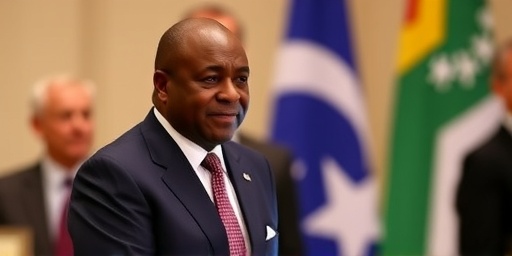In a powerful opening address that set the tone for international dialogue, South African President Cyril Ramaphosa declared the G20 Summit officially underway, positioning South Africa as a beacon for global cooperation in the face of mounting worldwide challenges. Speaking from the historic Union Buildings in Pretoria, Ramaphosa emphasized multilateralism as the only viable path forward to confront issues like crippling debt loads, urgent climate adaptation needs, and the pursuit of sustainable development goals. “We stand at a crossroads,” Ramaphosa stated, his voice resonating with urgency, “where division weakens us all, but unity can forge a resilient future for every nation.” This summit, the first G20 hosted by an African nation in over a decade, arrives at a pivotal moment, with global economies still reeling from pandemics, conflicts, and environmental disasters.
- Ramaphosa’s Vision: Reviving Multilateralism in a Fragmented World
- Debt Relief Push: Alleviating the Burden on Emerging Economies
- Climate Adaptation Front and Center: Protecting the Most Vulnerable
- Sustainable Development Pathways: Building Inclusive Growth
- Global Leaders Rally: Expectations and Potential Outcomes
The event draws leaders from the world’s 20 largest economies, representing about 85% of global GDP and two-thirds of the world’s population. Ramaphosa’s remarks highlighted South Africa‘s unique perspective as a developing economy grappling with inequality, making it an ideal host to bridge divides between the Global North and South. As delegates from powerhouses like the United States, China, and the European Union converge, the summit’s agenda promises intense negotiations on reforming international financial systems and amplifying voices from emerging markets.
Ramaphosa’s Vision: Reviving Multilateralism in a Fragmented World
President Ramaphosa wasted no time in framing the G20 as a revitalized platform for multilateralism, drawing on South Africa‘s post-apartheid legacy of reconciliation to underscore the need for collaborative problem-solving. “The G20 was born from the ashes of financial crises,” he reminded attendees, referencing the group’s inception in 1999 amid the Asian financial meltdown. Today, with inflation soaring to 8.7% globally in 2023 according to the International Monetary Fund (IMF), and geopolitical tensions from Ukraine to the Middle East exacerbating divides, Ramaphosa argued that isolationism is a luxury no one can afford.
In his 20-minute speech, Ramaphosa invoked the spirit of Nelson Mandela, calling for a “rainbow alliance” of nations to address inequities. He pointed to South Africa‘s own struggles, where youth unemployment hovers at 45%, as a microcosm of broader developing world woes. “Global cooperation isn’t just diplomacy; it’s survival,” he asserted, earning applause from African Union representatives. This emphasis on inclusivity marks a shift from previous G20 hosts like Indonesia in 2022, which focused more on health recovery post-COVID.
Experts note that Ramaphosa’s approach could reinvigorate the G20’s relevance. Dr. Thabo Mbeki, former South African president and G20 advisor, commented in a pre-summit interview, “Under Ramaphosa’s leadership, we’re seeing South Africa not just participating but steering the conversation toward equity.” Data from the World Bank supports this urgency: low-income countries face a $1.4 trillion annual financing gap for sustainable development, a figure Ramaphosa repeatedly cited to rally support.
Debt Relief Push: Alleviating the Burden on Emerging Economies
One of the summit’s cornerstone issues is debt relief, with Ramaphosa spotlighting how unsustainable borrowing traps nations in cycles of poverty. South Africa, hosting the G20 amid its own fiscal strains—public debt at 73% of GDP—advocates for innovative solutions like extended repayment moratoriums and fairer lending terms from institutions such as the IMF and World Bank.
According to a 2023 UN report, 60 low- and middle-income countries are in or at high risk of debt distress, up from 22 in 2011. Ramaphosa shared poignant stories from African peers, including Zambia’s recent default and Ethiopia’s ongoing restructuring talks. “Debt isn’t just numbers; it’s families denied education and health,” he said, quoting a Zambian farmer whose crops withered without access to affordable credit. The G20’s Debt Service Suspension Initiative, launched in 2020, has provided $13 billion in relief, but critics argue it’s insufficient without structural reforms.
In sessions dedicated to finance ministers, proposals include channeling $100 billion from Special Drawing Rights (SDRs) allocations—where wealthy nations received 70% of the $650 billion issued in 2021—to support vulnerable economies. Brazilian Finance Minister Fernando Haddad, representing the next G20 host, echoed Ramaphosa’s call: “Multilateralism demands we share the burden, not shift it.” South Africa‘s delegation, led by Finance Minister Enoch Godongwana, is pushing for a “debt-for-climate” swap mechanism, allowing countries to redirect repayments toward green projects.
- Key Stats on Global Debt: Total external debt of developing nations reached $11.3 trillion in 2022 (World Bank).
- African Focus: Sub-Saharan Africa spends 12% of GDP on debt servicing, more than on health and education combined (African Development Bank).
- G20 Commitment: Pledges to enhance the Common Framework for debt treatments, involving private creditors for the first time.
This agenda resonates deeply in South Africa, where municipal debts exceed R200 billion, hampering service delivery. Ramaphosa’s advocacy could yield tangible outcomes, potentially unlocking billions in aid if consensus is reached.
Climate Adaptation Front and Center: Protecting the Most Vulnerable
Turning to environmental imperatives, Ramaphosa positioned climate adaptation as a moral and economic priority, urging G20 members to fulfill pledges under the Paris Agreement. South Africa, battered by droughts and floods—like the 2022 KwaZulu-Natal deluge that killed over 400—knows the human cost firsthand. “We didn’t cause the climate crisis, but we’re paying the highest price,” Ramaphosa declared, calling for $100 billion annually in adaptation finance from developed nations, a target repeatedly missed since 2009.
The IPCC’s latest report warns that without urgent action, 3.3 to 3.6 billion people in vulnerable regions face irreversible losses. At the G20, discussions center on scaling up the Loss and Damage Fund established at COP27, with South Africa proposing contributions tied to carbon emissions—aiming at major polluters like China (30% of global CO2) and the US (14%). UN Secretary-General António Guterres, attending virtually, praised Ramaphosa’s leadership: “Global cooperation on climate is non-negotiable; South Africa‘s voice amplifies the Global South’s plea.”
Innovation takes spotlight too, with sessions on green technology transfer. South Africa‘s Just Energy Transition Partnership (JETP), securing $8.5 billion from G7 nations, serves as a model for phasing out coal while protecting jobs. Ramaphosa highlighted renewable potential: Africa’s solar capacity could power the continent 10 times over, yet investment lags at 2% of global clean energy funding.
- Adaptation Gaps: Developing countries need $215-387 billion yearly by 2030 for climate resilience (UNEP).
- G20 Role: Commit to mobilizing private finance, targeting $1 trillion in climate bonds by 2025.
- South African Initiatives: Launch of a national adaptation plan integrating indigenous knowledge for drought-resistant agriculture.
These talks could bridge the $300 billion annual adaptation funding shortfall, fostering resilience in flood-prone Bangladesh to arid Namibia.
Sustainable Development Pathways: Building Inclusive Growth
Beyond debt and climate, Ramaphosa outlined bold pathways for sustainable development, aligning the G20 with UN Sustainable Development Goals (SDGs). With only seven years until the 2030 deadline, progress is off-track: 575 million people may still live in extreme poverty, per UN estimates. South Africa‘s hosting amplifies calls for SDG financing, including reforming the UN Security Council for better representation.
Ramaphosa spotlighted gender equality and digital inclusion, noting South Africa‘s 25% female workforce participation gap. “Sustainable development means no one left behind,” he said, proposing a G20 fund for digital infrastructure in Africa, where internet access reaches just 43% of the population (ITU data). Partnerships with tech giants like Google aim to bridge this, potentially adding $180 billion to Africa’s GDP by 2025.
Trade reforms feature prominently, with Ramaphosa criticizing protectionist tariffs amid WTO disputes. India’s Commerce Minister Piyush Goyal responded positively: “Multilateralism through the G20 can harmonize trade rules for fair play.” South Africa pushes for agricultural subsidies reform, where rich nations spend $600 billion annually, distorting markets for farmers in Malawi or Kenya.
Health security rounds out the agenda, building on the 2022 Bali commitments. Post-COVID, vaccine equity remains key; Ramaphosa recalled South Africa‘s role in waiving IP rights for generics, urging stockpiles for future pandemics.
Global Leaders Rally: Expectations and Potential Outcomes
As the summit unfolds over three days, reactions from world leaders signal optimism. US President Joe Biden, via video link, affirmed commitment to global cooperation, pledging additional support for African infrastructure. China’s Xi Jinping emphasized shared prosperity, hinting at Belt and Road extensions aligned with SDGs. EU Commission President Ursula von der Leyen highlighted multilateralism‘s role in averting recessions, with Eurozone growth projected at 0.8% for 2024.
Civil society voices add pressure; Amnesty International’s Africa director called Ramaphosa’s opening “a clarion call for justice.” Protests outside the venue demand bolder action on inequality, echoing South Africa‘s own #FeesMustFall movements.
Looking ahead, the summit’s communique—expected by Sunday—could catalyze a new era. If debt relief expands and climate funds flow, it might prevent humanitarian crises in the Horn of Africa. For South Africa, success bolsters Ramaphosa’s domestic agenda ahead of 2024 elections. Ultimately, this G20 under Ramaphosa‘s stewardship may redefine global cooperation, turning rhetoric into resilient realities for billions.








